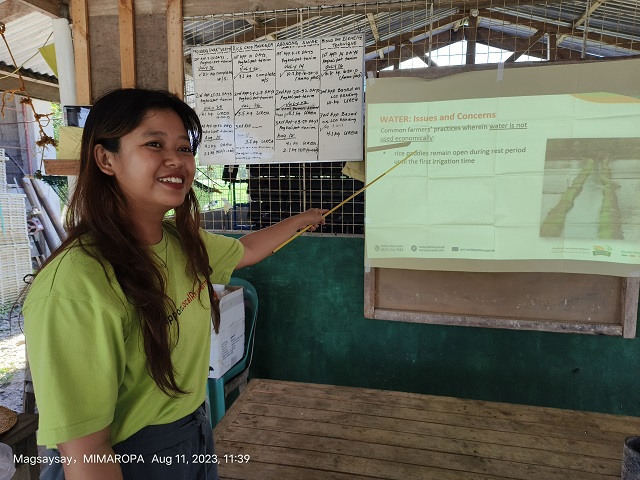
Grace Pastrana, a 25-year-old agricultural technologist from the Occidental Mindoro provincial agriculture office, is now a proud farmer-partner in improving the rice growers’ sustainable practices.
Having completed the Rice Competitiveness Enhancement Fund Rice Specialist Training Course (RCEF RSTC), Grace now serves as a valuable resource speaker, facilitator, and advocate for ecological farming practices in her province. The RCEF RSTC is a comprehensive training program that aims to develop rice specialists who can provide technical assistance and extension services to rice farmers across the country.
One of her preferred topics include the integrated pest management, which is the practice of combining the best available tools and techniques to reduce pest populations to non-damaging levels. It combines biological, cultural, and chemical methods for pest control.
“The training emphasized producing rice with minimal expenses – a practice I aspire our farmers to adopt. Often, when a farmer sees pests, even in small numbers, they instinctively spray pesticides without realizing the added production costs. This should be the last resort,” Grace emphasized.
Integrated pest management relies on the use of pest-resistant rice varieties and natural enemies are the primary ways to avoid pest infestations. Pesticide spraying is recommended only when necessary after applying other available control techniques.
The RSTC training not only expanded Grace’s knowledge in rice farming but also bolstered her confidence in sharing her expertise with fellow farmers.
A crop science expert, Grace was among the four training participants in 2022.
Entering the training, Grace experienced a mix of excitement and nervousness, surrounded by unfamiliar faces. However, her fears dissolved as she actively engaged in activities and learning sessions. Throughout the training, Grace concentrated on pest, disease, and nutrient management. Despite her academic background in agriculture, Grace candidly admitted to having limited knowledge in rice farming, which had previously hindered her interactions with farmers.
Grace said that the training empowered her with knowledge and skills that dispelled her insecurities. Two months post-graduation, she was already serving as a resource speaker and facilitator in Farmer Field Schools in their province.
Juvy Jane Auñgon, RSTC lead facilitator in Philippine Rice Research Institute praised Grace’s persistence.
“Despite frequent blackouts in Mindoro, Grace excelled in the online training, earning the highest participation score. She displayed leadership and has impressed the management team,” she shared.
Also an anchor in her province’s School-On-the-Air Program, Grace attributed her newfound confidence in answering farmers’ queries to the impact of RSTC and other training initiatives she has attended.
RCEF training or the Rice Extension Services Program is a component of Republic Act 11203 or Rice Tariffication Law, which allocates P10 billion fund every year for the rice farmers. Sponsored by Sen. Cynthia Villar, the program is a six-year government initiative to help the farmers compete in the international rice market. The local government units and lawmakers assist in its implementation.




